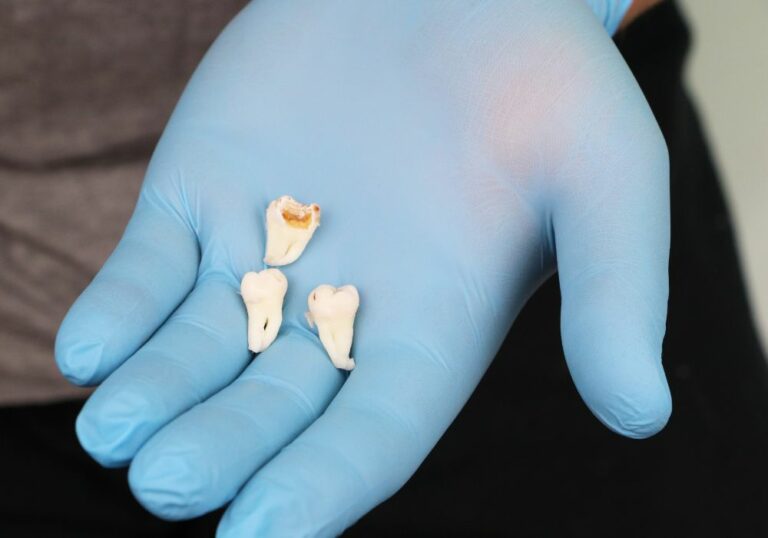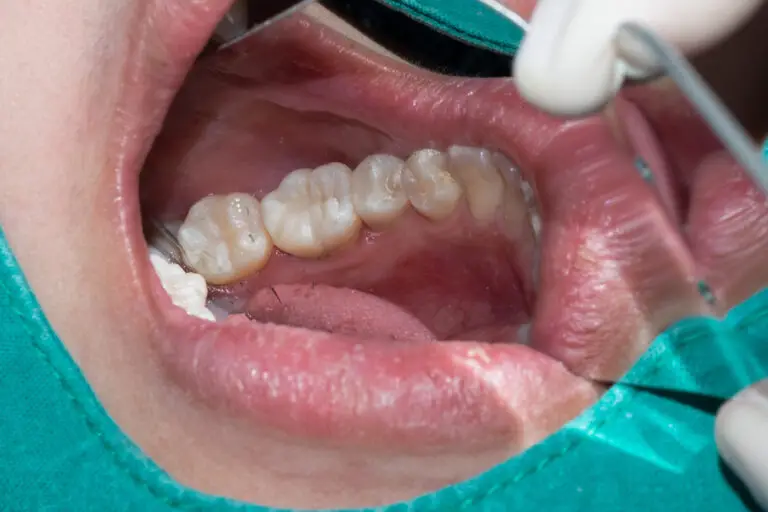Many people are using a range of teeth whitening products to achieve a brighter smile. However, for some, it can be an unpleasant experience because of tooth sensitivity. Is there anything you can do to stop your teeth from hurting after whitening?
In this article, we explore how to stop sensitive teeth pain immediately after whitening. We also share with you why your teeth may feel sensitive after whitening treatments. Continue reading to find out how you can reduce the risk of teeth sensitivity caused by whitening treatments.
Tooth Sensitivity After Whitening Treatments

Most people experience temporary tooth sensitivity after teeth whitening. Some people can even experience gum inflammation. Dental sensitivity after a whitening procedure is expected and generally nothing to worry about as in most cases it will go away on its own in due course.
But having sensitive teeth can cause you a lot of discomfort so it is natural to want to have your teeth feeling normal again as soon as possible. Luckily, there are some steps you can take to minimize the risk of sensitivity both during and following dental whitening treatments.
However, you should note that depending on the health of your teeth, the suggestions made in this article may not work or may only reduce the sensitivity. If your teeth are still sensitive after you have followed the suggestions, it would be a good idea to get your dentist to examine your teeth for the underlying cause behind your sensitive teeth.
Why Do Whitening Treatments Make Your Teeth Sensitive?
The ingredients used in many dental whitening products include hydrogen peroxide and carbamide peroxide. When the peroxides come into contact with chromogens, which are the bacteria living on your teeth, it creates a chemical reaction. Chromogens are what cause the stains on our teeth and the chemical reaction removes them.
Following the chemical reaction, which removes stains from your teeth, your teeth will be of a lighter shade. However, sometimes the peroxides can come into contact with the more sensitive layers of the teeth, which are below the tooth enamel and trigger sensitivity.
The job of the tooth enamel is to protect the dentin and pulp, which are the other two layers in our teeth. When the enamel is worn, outside stressors, such as the peroxides used in whitening treatments, can come into contact with the inner layers or tooth nerve and cause discomfort and pain.
If the whitening product comes into contact with the more sensitive parts of your teeth, your teeth may hurt when you are consuming hot, cold, sweet, sour, or acidic foods and beverages. You may also experience sensitivity and pain while brushing your teeth. For some people, breathing cold air may also cause pain in the teeth.
Preventing Teeth Sensitivity Before Whitening Treatments

While it may not always be possible to completely stop tooth sensitivity that can result from whitening treatments, following the tips below should lower the likelihood of tooth pain caused by the treatment. They can also speed up the recovery of your teeth following the procedure.
Use Desensitizing Toothpaste
You can reduce the risk of sensitive teeth by starting to use desensitizing toothpaste about ten days before the whitening treatment. The toothpaste is designed to block pain signals from traveling from the surface to the nerve. For maximum effectiveness, leave the toothpaste on your teeth for around two minutes before rinsing.
Use Desensitizing Gel
You can maximize the effect of the desensitizing toothpaste by using desensitizing gel. Apply the gel just before your treatment and leave it to work for the time recommended for the specific product. Rinse your mouth with water when the time is up.
Take Pain Killers
You can also control the pain caused by whitening treatments by taking some over-the-counter pain medication, such as ibuprofen, before the treatment. If you have lingering sensitivity following the treatment, you can continue with the pain medication.
However, pain medication should not be used to treat dental sensitivity in the long term. If the tooth sensitivity does not go away, stop taking the medication and contact your dentist.
Use Products with Fluoride
You can ask your dentist for a fluoride varnish. Your dentist will apply the varnish onto your teeth to form a thin layer. This adds an extra protective layer between the outside stressors and the inner layers of your teeth. The protection from the varnish can last up to eight weeks. Alternatively, use fluoride toothpaste and mouthwash at home.
Reducing Tooth Sensitivity After Whitening Procedures

While the above measures can help to prepare your teeth for the whitening procedure, you can also take steps to shorten the intensity and duration of sensitivity following the treatment.
Choose What to Eat Carefully
Certain foods and drinks are more likely to cause you more dental discomfort than others. Because your teeth will feel the most sensitive during the first two days after the procedure, it is advisable to avoid foods and drinks that can make the sensitivity worse.
Hot and cold foods and drinks are both likely to cause you some level of discomfort after teeth whitening. Food and drinks are better consumed at room temperature or use a straw for hot or cold beverages. You should also avoid acidic, sweet, and sour foods and drinks. After a few days, you should be able to eat normally with no discomfort.
Continue the Use of Desensitizing Products
To avoid tooth sensitivity after dental whitening, continue using the desensitizing toothpaste after your whitening treatment. You can also continue applying the gel for 48 hours after the treatment.
Correct Brushing
Brushing with a brush that is too hard or using too much pressure when brushing your teeth can increase tooth sensitivity. Choose a soft-bristled toothbrush and brush your teeth gently. When finished, rinse your mouth with lukewarm water.
Use Tooth Whitening Products with Less Peroxide
The higher the concentration of the peroxide in the whitening product, the more risk there is of dental sensitivity. To minimize the risk of sensitivity during and following a whitening treatment, choose products with lower concentrations of peroxide.
Reduce the Amount of Whitening Product
As well as using products that contain less peroxide, you can also reduce the amount of whitening product you use when using an at-home whitening tray. You only need a small drop for each tooth. If there is too much product, the tray will overflow and the product can come into contact with your gums and cause irritation.
Wait Longer Between Treatments
If you have already swapped to a whitening product with a lower concentration of peroxide and reduced the amount you use but still experience sensitivity, leave longer between treatments. Skipping a few days will give your gums and teeth time to heal. You may also need to take a longer break, maybe a month or two before trying again.
Get Professional Dental Whitening
If you are using at-home whitening kits and find that your tooth sensitivity continues despite following all the steps, consider getting a professional to do the job. It is safer and faster and will minimize the risk of the whitening agents coming into contact with your gums and causing irritation.
How Long Will Tooth Sensitivity Last?

How long your teeth will remain sensitive after a whitening treatment varies but for most people, their teeth are back to normal at the latest four days following the treatment. However, since everyone’s teeth are different, the duration varies.
Remember that if the sensitivity does not go away, speak to your dentist as you may have an underlying dental health issue. Dental issues that can make the sensitivity worse include tooth decay, cracks in your teeth, exposed tooth nerves or dentin layer, or broken or defective dental restorations, such as crowns, fillings, or inlays.
Looking After Your Whitened Teeth
Since you do not want to repeat whitening treatments too often as this can increase the risk of tooth sensitivity, try to avoid environmental factors that cause stains on your teeth. The best ways to keep your teeth whiter include having a proper dental hygiene routine and avoiding foods and drinks that stain your teeth.
Your dental hygiene routine should include brushing twice and flossing once a day. Visit your dentist regularly for checkups and cleaning. Avoid eating dark fruits such as blueberries and drinking red wine, dark colas, coffee, and tea. Do not use tobacco products to keep your teeth whiter as well as to protect your overall health.
Conclusion
It is common to experience tooth sensitivity following teeth whitening treatments. Your teeth may be sensitive to extreme temperatures and you may feel discomfort when brushing your teeth. For most people, this sensitivity disappears a few days after the treatment.
You can take steps both before and after the whitening treatment to minimize the risk of sensitivity. While it is not always possible to completely eliminate the sensitivity, the steps may help reduce the severity and duration of the discomfort after the treatment. If your teeth continue to be sensitive, contact your dentist for a checkup.






